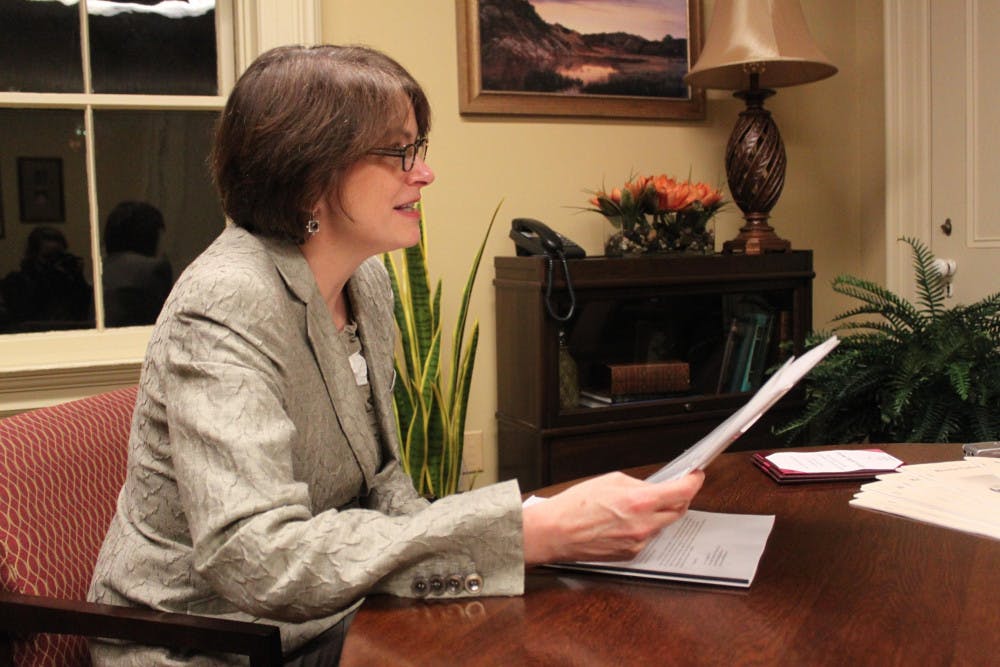President-elect Christina Paxson discussed financial aid, public health and the University's expansion with faculty members, administrators and representatives from the graduate and undergraduate student bodies Thursday during her second official visit to the University since being named Brown's 19th president in March.
The trip is intended to continue Paxson's process of learning more about the University and getting to know the administrators and student leaders she will be working with upon assuming the presidency July 1, she said. After reading about her future colleagues, Paxson said, "I just need to start to establish personal relationships with them."
Paxson met Thursday with six vice presidents of the University, Dean of the Graduate School Peter Weber and Terrie Wetle, associate dean of medicine for public health and public policy. Paxson also had lunch with members of the Graduate Student Council and dinner with the outgoing and incoming executive boards of the Undergraduate Council of Students.
Paxson arrived Wednesday evening and will be at Brown until Saturday. She is attending events in conjunction with the Women's Leadership Conference celebrating the 120th anniversary of women at Brown.
As Paxson meets with more members of the community, she will develop a greater understanding of major issues on campus, she said. "What talking to so many people does is it adds nuance and context, and I'm beginning to get a better sense of what people's priorities are," she said.
Paxson met 18 UCS members for dinner Thursday night. After briefing Paxson on the history of UCS and its relationship with the University president, students discussed financial aid, student group funding, the council's role in Paxson's transition and student involvement in the tenure process, said UCS President-elect Anthony White '13.
The conversation particularly focused on communicating student perspectives and ways in which UCS can support Paxson "so that she can really hit the ground running," White said.
White, who is also a co-founder of Brown for Financial Aid, said he was heartened by the commitment to financial aid priorities Paxson expressed during their discussion.
"It was reassuring to hear that there is this very hopeful feeling about improving financial aid," he said. "There's this push and desire to fundraise, and this sort of enthusiasm to move financial aid forward is very encouraging." UCS members also spoke with Paxson about how to balance the two major priorities of going need-blind for all students and reducing the loan burden, White said.
Wetle spoke with Paxson about the public health program's research, academics and faculty and about the movement toward a school of public health, Wetle said. Paxson, who began her career in development economics, has often examined public health issues in her scholarship.
Wetle said the meeting was productive and that she looked forward to working with the president-elect. "She was very insightful in the questions that she asked. She's a very quick study," Wetle said, adding that Paxson "was really enthusiastic in our interaction."
Richard Spies, executive vice president for planning and senior adviser to the president, also met with Paxson during the day to discuss the recent history of planning initiatives at the University and "the larger set of community issues" Paxson will face, Spies said. The visit was an opportunity for Paxson to gain further knowledge about the University "rather than forming judgments," said Spies, who will step down at the end of this year.
The future of Spies' position, which was created for him under Simmons, remains undecided. "I am still finalizing plans for how the office will be structured," Paxson said, adding that she plans to decide that structure within the next month.
Spies said the position will probably change somewhat, given that the University itself will be changing. "I think my assumption - and this is not because of any insight or information - is that it will change," he said. "I think it's likely that it doesn't exist as a separate office."
Paxson expressed appreciation for the announcement this week of the solution to negotiations with Providence over Brown's financial contributions to the city. "I'm grateful to President Simmons for having finished that before she stepped down," Paxson said. "What it means is we will be transitioning to, I hope, a new phase of the relationship with the city."
During her lunch with seven officers from the Graduate Student Council, Paxson engaged in "a good and frank exchange of opinions," said GSC President Matteo Riondato GS. GSC members talked with Paxson about their role as student leaders, as well as "what we think needs to be changed or needs to be improved," Riondato said, though he declined to elaborate on specific issues.
Riondato said he was impressed by the openness of the discussion and Paxson's willingness to speak directly with the students. "She came down by herself without any assistant or without any secretary. It was just her and us," he said. "I think that was wonderful because we could really be completely open."
Paxson told The Herald that she plans to visit the University again for Commencement, though she will not play any official role in the ceremony.
She will move to Providence in mid-June, a few weeks before her presidency begins, which will allow time to meet with more University staff and leaders in the city and state, she said. Her husband plans to commute between Providence and his work in New York City, while Paxson's younger son will remain at his current high school in Pennsylvania as a boarder, she said.

ADVERTISEMENT




